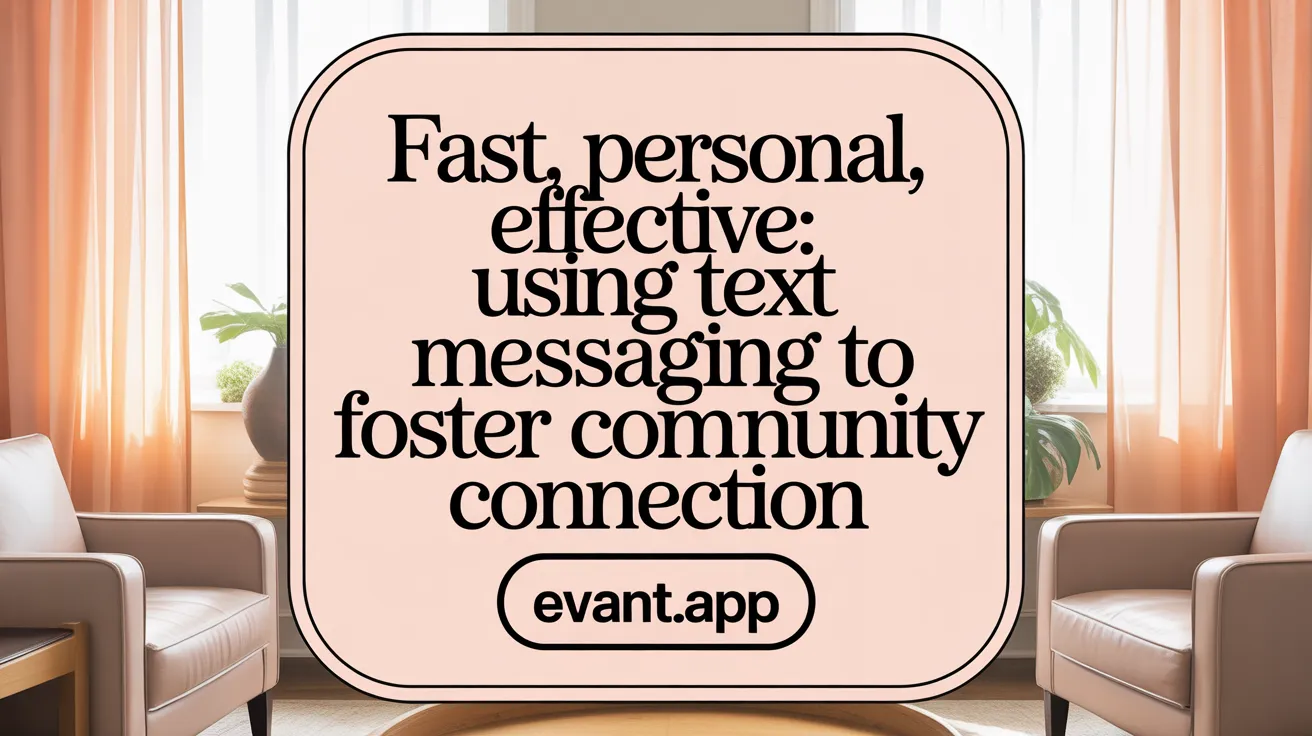Harness the Power of SMS for Faith-Based Event Management
Faith communities increasingly turn to text messaging as a reliable and efficient way to manage event invitations and RSVPs. With near-instant delivery and high engagement rates, SMS offers a streamlined, personal connection that enhances event coordination and community involvement. This guide explores essential strategies, best practices, and resources for faith leaders seeking to implement effective text-based RSVP systems for their events.
Using Text Messaging for Faith Community Event Invitations and RSVPs

How can text messaging be used for event RSVPs and invitations within faith communities?
Text messaging serves as a valuable communication tool for faith communities to invite members to events and manage RSVPs efficiently. Due to its high engagement rate—about 98% of texts are opened within three minutes—it ensures messages are seen quickly. Churches can build permission-based contact lists through opt-in methods such as digital connection cards, QR codes placed at entrances, or announcements during services. These contacts can then receive personalized invitations through SMS platforms like SuperPhone or GroupMe.
Automated workflows allow churches to send reminder messages, follow-ups, and updates in real time. Segmenting audiences enables tailored communication—for instance, separate messages for volunteers, visitors, or long-time members—boosting response and participation. Integrating text messaging with event planning tools also streamlines the check-in process using QR codes and keywords, making participation seamless. Plus, including donation prompts or volunteer opportunities within invitation texts can increase community involvement and support.
Overall, SMS allows faith communities to coordinate events smoothly, reaching members where they are, in a way that fosters genuine engagement and community connection.
Best Practices and Strategic Management of RSVP Text Communications

What are the best practices and strategies for managing event RSVPs via text messaging?
Managing RSVPs through text messaging can greatly improve the efficiency of event planning and foster better communication. To maximize effectiveness, it’s important to craft clear, concise, and personalized invitation messages. Including simple reply options, such as specific keywords or clickable links, makes it easy for recipients to respond.
Timing plays a crucial role. Send invitations well in advance to give attendees ample time to respond. Follow up with automated reminder messages as the event approaches to increase response rates.
Systematic tracking of responses—using integrated RSVP forms or response management tools—helps organize replies immediately and keeps everyone informed.
When replies are received, acknowledge them promptly. Confirm attendance details and maintain a courteous, respectful tone suited to the event’s context.
Combining automated systems with polite communication ensures responses are managed in a respectful, organized manner, reducing confusion and missed responses.
What ethical considerations and etiquette should be followed when using text messaging for church outreach and event management?
When deploying text messaging within a church setting, always prioritize consent. Obtain explicit opt-in approval from members before sending messages, and provide clear options for opting out at any time, respecting privacy laws such as the Telephone Consumer Protection Act (TCPA).
Messages should be relevant, focused, and sent during appropriate hours to avoid becoming intrusive. Segmenting the congregation into targeted groups allows for more personalized and appropriate communication.
Respect the tone of your messages. They should reflect biblical principles of humility, love, and stewardship, avoiding contentious topics and fostering a caring atmosphere.
Effective etiquette includes using automated systems to manage opt-outs and ensuring compliance. Be mindful not to disrupt church activities or worship services with intrusive messages.
Overall, the goal of communication should be to build community, support attendees, and uphold the virtues of integrity, grace, and compassion. Respectful, ethical messaging reinforces trust and strengthens the church community.
Step-by-Step Guide to Organizing and Managing Event RSVPs via Text

How to craft invitation messages with key details and RSVP keywords
Creating an effective invitation message is the first step in managing event responses via text. Ensure your message is polite, clear, and includes essential details such as the event date, time, location, and purpose. Incorporate a call-to-action using simple RSVP keywords like "YES" or "NO" that recipients can reply to easily. You might also include instructions for how to reply, such as replying with the number of guests or meal preferences, to streamline planning.
How to use bulk SMS platforms and response tracking features
Leverage bulk SMS platforms like Trumpia or WordPress plugins with Twilio integration to send your invitations. These platforms facilitate large-scale messaging while enabling personalized touches. Use their response tracking features to monitor replies, ensuring all responses are collected efficiently. Proper segmentation of your contact list ensures the right messages reach the right groups, increasing response rates.
How to set up automated responses and reminders
Setting up an automated response system helps confirm each RSVP instantly and records responses for your reference. Configure two-way messaging so that reply responses are automatically acknowledged. Schedule reminder messages leading up to your RSVP deadline to prompt quick replies, enhancing attendance certainty. These workflows support smooth communication without manual follow-ups.
Monitoring and updating guest lists
Keep track of responses in real-time by monitoring incoming replies through your SMS platform. Use this data to update your guest list actively. If a guest confirms attendance, mark them as attending; if not, note their non-participation. This up-to-date list helps with event logistics, such as room setup, catering, and materials preparation.
Post-event follow-up communications
After the event, continue engagement by sending thank-you messages to attendees. Include surveys or feedback forms to gather insights and show your appreciation. Based on responses and interests, invite guests to future events. Proper follow-up fosters community, encourages repeat attendance, and helps improve future gatherings.
| Step | Action | Tools/Details |
|---|---|---|
| 1 | Draft invitation message | Clear details + RSVP keywords like YES/NO |
| 2 | Send bulk SMS | Platforms such as Trumpia, Twilio |
| 3 | Configure responses | Automated replies, response tracking |
| 4 | Monitor replies | Real-time updates, list management |
| 5 | Follow up after event | Thank-you texts, surveys, future invites |
Implementing these steps ensures smooth handling of RSVPs via text, encouraging timely responses and active community participation.
Enhancing Engagement: Digital Invitation Tips and Volunteer Coordination via SMS
What are some effective tips for digital invitations and engagement through text messaging?
To make your digital invitations compelling and increase engagement, personalization is essential. Craft concise, clear messages that fit within a 160-character limit, including a strong call-to-action like RSVP links or prompts to reply. Timing matters—send reminders close to the event date to boost attendance. Segment your audience based on interests or past interactions to customize messages, making them more relevant and impactful. Incorporate interactive elements such as quick polls or contests to encourage participation. Adding incentives like exclusive offers or sneak peeks can also entice recipients. Foster loyalty by maintaining a friendly tone, respecting privacy, and avoiding over-messaging. Combine SMS with other channels like social media, QR codes, and emails for a seamless, multi-channel experience that maximizes outreach.
How can SMS be used to facilitate volunteer engagement, follow-up, and event check-in?
SMS offers an immediate and direct way for churches to connect with volunteers and attendees. You can send timely reminders about upcoming volunteer opportunities or events, encouraging participation. Quick response options enable volunteers to confirm availability or update preferences, streamlining check-in processes. During events, SMS can be used to check in volunteers, provide spiritual encouragement, or send real-time updates. Post-event, automated workflows can include thank-you messages, feedback surveys, and invitations to future activities. Segmented contact lists allow for personalized communication — for example, sending prayer requests or specific volunteer tasks to relevant groups — fostering stronger engagement. With high open and read rates, SMS helps churches maintain consistent communication, supporting growth in community participation and spiritual connection.
Templates, Tools, and Resources for Faith-Based SMS Event Communication
Are there guides and resources available for implementing SMS-based communication for church or faith-based events?
Yes, numerous resources exist to assist churches in adopting SMS communication strategies. These guides typically include step-by-step instructions, do's and don'ts, and best practices to ensure effective messaging. Leading providers like Tithely Messaging, Flocknote, and Tatango offer specialized tools with automation, personalization, and segmentation features tailored for faith communities.
These resources highlight important considerations such as gaining opt-in consent from members, crafting concise and compelling messages, and scheduling texts to maximize impact. Many also offer templates and sample messages which simplify the creation process.
Using these tools and guides, churches can enhance outreach efforts, boost event attendance, and nurture stronger connections within their communities through targeted and respectful SMS campaigns.
Maximizing Community Connection Through Text-Based RSVP Systems
Implementing effective text message RSVP systems empowers faith communities to enhance event planning, boost participation, and foster stronger relationships. Through thoughtful messaging, respectful engagement, and smart use of automation tools, churches can streamline communication and deepen community ties. As technology continues to evolve, mastering SMS-based event coordination will remain a vital tool for faith leaders seeking to nurture vibrant, connected congregations.
References
- Ultimate Guide for using Text In Church for Outreach Events
- Using Text In Church for Event Follow-up
- How to Send or Respond to an RSVP via Text Message - wikiHow
- Letter of Invitation to a Church Program: Guide and Samples
- Using SMS for church announcements and engagement
- SMS for Churches: Effective Communication Solutions | Beambox
- How to Use Church Texting to Boost Attendance and Engagement
- SMS for churches: How it works - Textline
- Top 10 Texting Services for Churches and Best Practices - Tatango
Related Blogs


How Community Churches Should Leverage SMS to Boost Engagement
Michael PedoeemStruggling with low church attendance? Discover how to leverage SMS to reach 98% of your congregation instantly and review the top 5 church communication platforms.


SMS for Churches: A Guide to Better Engagement
Michael PedoeemLearn how SMS for churches can boost engagement, improve communication, and streamline event management. Discover best practices for church texting today.
Ready to transform your community










